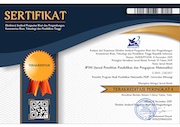Keefektifan Problem Based Learning untuk Meningkatkan Kemampuan Literasi Matematis Siswa
Abstract
This research aims to test the effectiveness of mathematics learning with the problem based learning and the conventional learning in junior high School (SMP) to improve the skills of mathematical literacy. The research uses the Quasi experiment method, with the design of the non-equivalent control group Pretest-Posttest. This study used two groups, one group as an experimental group that received the treatment of problem-based learning and one other group as a control group that received conventional learning treatment. The subject of this study was 64 students in two classes VIII at SMP Negeri 2 Magelang. The instrument used is a description test to measure the ability of students ' mathematical literacy. A large calculation of mathematical literacy skills is improved using the normalized gain equation <g>. The results showed that mathematics learning using problem-based learning can improve students' mathematical literacy skills. In addition, the research also concluded that there were no significant differences in the enhancement of the mathematical literacy skills of good students using both problem based learning and conventional learning. In experimental groups and control groups there is an increase in medium.
Keywords: problem based learning; mathematical literacy
Full Text:
PDFReferences
Akinoglu, O. & Tandogan, R. O. (2006). The Effects of Problem-Based Active Learning in Science Education on Students’ Academic Achievement, Attitude and Concept Learning. Eurasia Journal of Mathematics, Science & Technology Education, 2007, 3(1), 71-81
Etherington, M. B. 2011. Investigative Primary Science : A Problem Based Learning Approach. Australian Journal of Teacher Education, Vol. 36, 9. British Columbia : Trinity Western University
Hake, R.R. (1999). Interactive-engagement vs traditional methods: A six thousand student survey of mechanic test data for introductory physics courses. Journal of Physics. 66 (1): 64-74.
Mevarech, Z. R., & Kramarski, B. (2014). Critical maths for innovative societies: The role of metacognitive pedagogies.Paris: OECD Publishing. http://dx.doi/org/10/1787/9789264223561-en
OECD, PISA. (2015). draft mathematics framework, 2013
Ojose, B. (2011). Mathematics literacy: Are we able to put the mathematics we learn into everyday use? Journal of Mathematics Education, 4(1), 89–100.
Padmavathy, R. D. & Maresh, K. (2013). Effectiveness of Problem Based Learning In Mathematics. International Multidisciplinary e-Journal, 2 (1), 45-51
Ronis, D. (2005). Problem-Based Learning for Maths and Science: Integrating Inquiry and the Internet. Victoria: Hawker Brownlow Education
Sari, M. P. & Khiyarunnisa, A. (2017). Problem Based Leraning: Upaya meningkatkan Kemampuan Literasi Matematika Siswa. Seminar Nasional Matematika dan Pendidikan Matematika UNY. M.65. (ISBN. 978-602-73403-2-9 (Cetak)/ 978-602-73403-3-6 (On-line))
Savery, J. R. 2006. Overview of Problem Based Learning : Defenition and Distinctions. The Interdisclipinary Journal of Problem Based Learning, 1 (1), 9
Surya, E & Syahputra, E. (2017). Improving High-Level Thinking Skills by Development of Learning PBL Approach on the Learning Mathematics for Senior High School Students. International Education Studies, 10(8), 12-20
UNESCO. (2016). Literacy for All. http://en.unesco.org/themes/literacy-all. diakses 2 November 2018
Wardono,et all. (2017). Development of innovative problem based learning model with PMRI-scientific approach using ICT to increase mathematics literacy and independence character of junior high school students. Journal of Physics: Conference Series. doi :10.1088/1742-6596/983/1/012099
Wardono & Mariani. (2018).The analysis of mathematics literacy on PMRI learning with media schoology of junior high school students. Journal of Physics: Conference Series doi :10.1088/1742-6596/983/1/012107
DOI: https://doi.org/10.37058/jp3m.v5i2.957
Refbacks
- There are currently no refbacks.
©2017 JP3M (Jurnal Penelitian Pendidikan dan Pengajaran Matematika)
Program Studi Pendidikan Matematika
Fakultas Keguruan dan Ilmu PendidikanÂ
Universitas Siliwangi
Jl. Siliwangi No. 24 Kota Tasikmalaya - 46115
email: [email protected]
e-ISSN: 2581-2807 ; p-ISSN: 2460-8599

This work is licensed under a Creative Commons Attribution-NonCommercial-ShareAlike 4.0 International License.
StatCounter:
Detail


